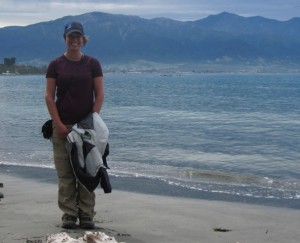
Emily Melvin ’12 in New Zealand
“At 12:51 p.m., I was outside talking to a friend when the ground began to shake. We moved away from the apartment building that we were standing under and watched as it swayed back and forth. Having never been in an earthquake, none of us were aware of how strong it had actually been,” says Emily Melvin ’12 (Seaford, N.Y.).
A double major in geology and American studies, Melvin is studying in New Zealand and experienced the recent devastating earthquake in Christchurch. She came to New Zealand as part of a geology semester abroad group.
Melvin explains, “If I hadn’t been in the Christchurch earthquake, I wouldn’t have been able to fully understand the effects that a disaster can have on those who survive and have minimal personal losses. Being in this disaster will definitely enhance my research and allow me to better connect to others that have also been victims of a disaster.”
Melvin is among four Lafayette student groups selected to receive support for their projects through the National Academy of Engineering’s Grand Challenges Program. The premise at Lafayette is that solving complex challenges necessitates innovative solutions with joint contributions from engineering and the liberal arts.
Students in the program will initiate their research projects during the summer following their junior year and complete them as a thesis or independent research during their senior year that they will present. Through a gift from a Lafayette alum, these groups will receive $3,000 in summer research stipends, plus a budget of up to $3,000 for project expenses, and housing during the summer of their junior year to work on the project.
Melvin hopes to learn more about the social effects that natural disasters have on their victims and how to best respond. She will also explore how the preparation for and response to natural disasters differs between the United States and other countries.
“I have learned firsthand how disasters cause much more damage than is visible,” she says. “This project will make me better prepared for my future goal to work in emergency management. I hope that through this research I will learn more about how we can better prepare ourselves for disasters and their aftermath.”
Felix Hutchison ’12 (Plainsboro, N.J.), an electrical & computer engineering major, and Yue (Luna) Yuan ’12 (Wuhan, China), a double major in mechanical engineering and policy studies, are focusing their project on “Reverse Engineering the Brain.” The pair will design and build electrical models that mimic certain key features of the brain. They will then create a hardware implementation of an artificial neural network and examine the feasibility of scaling the technology down to be used for small-scale processing tasks.
“Lafayette’s whole campus has an attitude of ‘let’s get involved!’ that makes it such an excellent place to pursue projects like this,” says Hutchison, who plans to pursue a Ph.D. in electrical engineering after graduation. “There is no goal too high that, with all of the resources and faculty that we have at Lafayette, you are not able to accomplish.”
Also chosen for the Grand Challenges Program, Jared Katz ’12 (Stoneham, Mass.), who has a self-designed major in archaeology, and Katherine Metcalf ’12 (Springfield, Va.), who has a self-designed major in linguistics, will explore human cognition. They will look specifically at metaphor as a trend in universal linguistics development to suggest an aspect of human cognition and a means of ordering the world.
Their study will examine hieroglyphic morphemes (small linguistic units) that existed in the ancient languages of Sumerian cuneiform, Egyptian hieroglyphics, and Mayan hieroglyphics. Ancient languages provide them with evidence containing minimal cross-cultural borrowing, yielding an examination of cognitive processes instead of influence from foreign cultures. The pair hopes to establish a structural model with which to compare all metaphors.
Thomas Benjamin ’12 (Norristown, Pa.), a chemical engineering major, and Elliott Mitchell-Colgan ’12 (Henderson, Nev.), an electrical & computer engineering major, are looking to restore urban infrastructure. They will analyze the energy production potential of small hydroelectric power systems for their economic feasibility in use during storm-related power outages. They will also test the viability of this type of system in various socioeconomic contexts, including in flood relief efforts by humanitarian aid organizations, NGOs, and militaries.
